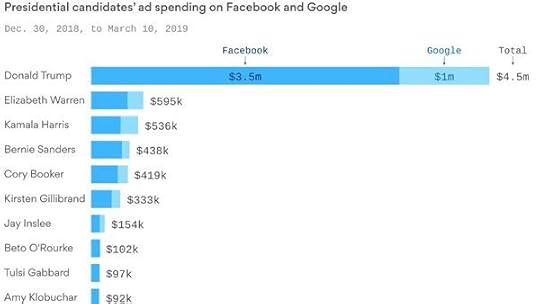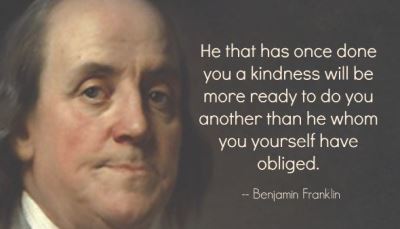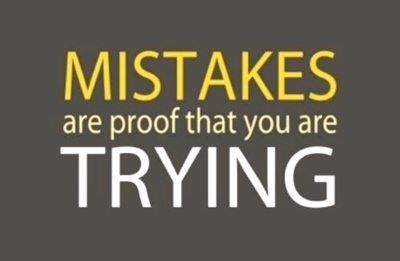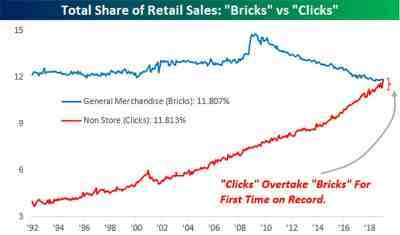Jeremie Averous's Blog, page 40
August 17, 2019
How the Trump Campaign Already Brings Serious Lessons About Social Segmentation Capabilities
In this excellent post ‘Trump’s Digital Campaign for 2020 Is Already Soaring‘, Frederic Filloux explains how the Trump 2020 campaign is already extremely active, focusing on voter segmentation so as to serve the most effective targeted propaganda through social networks. And it seems that the scale is quite unprecedented.

Trump digital campaign has started almost just after the election and has already spent much more money than any other campaign: “we’re doing top-level funnel marketing and what that is, is we need to find every person that’s going to vote for the president and would vote for the president and go find them now. It’s a lot cheaper to go find them now, not when the media gets all and the advertising is more expensive and we have to rush to find them. Why not find them three years out?“
The important thing is that now targeting is not any more at the group level – it is at the individual level and extremely fine. Messages can be adapted to address individual concerns and worldview. Therefore the potential for influence is extreme, because potentially people will be engaged individually with messages that are deemed adequate for them.
The power of this approach remains to be seen in the next elections, but it is of course quite worrying to observe how this is becoming an influence machine that borders on manipulation.

August 15, 2019
How We Increasingly Use Avatars on Social Internet
In this excellent Quartz obsession piece ‘Avatars‘, the issue of the increasing usage of multiple avatars for ourselves in the cyberworld is explored at length. This is something we had identified early (think about how many email addresses you possess!) but it has now spread to full contextual persona and avatars.

“People love to see themselves rendered in many forms. Tech companies know this, and they’re not afraid to invest millions of dollars in the hope that this strange quirk of human narcissism can translate into serious cash.” Specific functionalities, and even start-ups, are created around this: proposing the best avatar options, allowing full personalization and allow us to explore various aspects of our personalities.
And it would seem that the rhythm of avatar creation is rather accelerating rather than slowing down, as well as the associated business value, showing that it really corresponds to a need profoundly linked with our identity.
I feel this trend is rather enriching, allowing people to test other parts of themselves in possibly a semi-social online context. In any case I can’t wait to read psychological research associated with this trend!

August 13, 2019
How Demanding Freedom Can Be
In the ‘Discourse of voluntary servitude’, La Boetie, a French philosopher of the 16th century, writes a formidable quote: “Man has a preference for voluntary servitude, because servitude is confortable and makes one irresponsible. Freedom on the other hand is very demanding.”

Those words written in the context of a political essay on dictatorship do echo in the modern organization. “Voluntary servitude” in an organization is much easier and much more comfortable than freedom. And that is something that people tend to forget when salaried workers express jealousy with respect to the self-employed or entrepreneur.
As an entrepreneur I do feel sometimes when I am tired or things are difficult that I would be certainly much more comfortable being just another piece of a large organization… although clearly the comfort is just an illusion: just notice how many people report they are stressed in the workplace.
Freedom is extremely demanding. It requires a lot of leadership and a lot of self-leadership and discipline. In the long run it is extremely rewarding too.
Choose freedom. It’s tough, but it’s worth it!

August 10, 2019
How the French School System Develops the Feeling of Unworthiness in students
Following up on the previous post ‘How to Respond When You Feel Unworthy‘ I would like to share with my French readers how it is becoming increasingly obvious to me that the French school system specifically develops the feeling of unworthiness in students.

In particular in competitive classes like ‘Preparatory Classes’ for major schools or in elitist high schools, teachers tend to try to motivate students by telling them they are no good, much less clever than the previous class, that they have no change of ever succeeding etc.
This behavior has many consequences: those who survive the treatment self-select themselves, and this fosters the feeling of unworthiness in students which will follow them up all their life.
In many other countries, even in competitive classes, teachers generally seem to tend to be more supportive of students, and encourage their successes.
I would maybe even suggest that this behavior in France has some substantial long-term consequences on the psyche of the elite students which form after some time the country’s elite.
I am not quite sure about the reason for this behavior but it is becoming now quite obvious to me, having been living abroad and having now children than enter those competitive classes. Maybe we should try to change this, in particular in view of the changes in the world surrounding us!

August 8, 2019
How to Respond When You Feel Unworthy
I found a lot of personal resonance in this excellent post by Leo Babauta ‘The Universal Narrative: When You Feel Unworthy‘. I recommend the full read. How can we respond when in a certain situation (or more generally), we feel unworthy, we feel that we are not good enough?

The feeling of unworthiness has significant consequences on our life: from procrastination to lack of participation in a group to the quality and genuineness of our relationships.
Of course Leo Babauta reminds us that it is just a story we are telling ourselves. So he proposes two approaches to this issue:
write down a mantra that we can use whenever we feel unworthy, to make us believe otherwise over time (his mantra is “The world craves you and your gift“ensure this narrative dissolves by wondering how it would feel if it would not be present
Next time you will feel unworthy, consider speaking out the mantra and dissolve this idea. We should not feel unworthy because we are not.

August 3, 2019
How to Use the Ben Franklin Effect to Build Relationships
The Ben Franklin Effect (here on Wikipedia and on Quartz) is an interesting psychological effect: “a person who has already performed a favor for another is more likely to do another favor for the other than if they had received a favor from that person“. And we might use it more often.

As explained in Wikipedia, this effect can be used in commercial relations as well as in mentor-mentee situations. It can be triggered quite easily as in the famous personal example given by Franklin.
What is appalling of course is the reverse effect. “You tend to like the people to whom you are kind and dislike the people to whom you are rude“. The reverse effect might explain vendettas and other inadequate behaviors.
I am particularly interested about the experiment on the reverse effect which was performed in an educational context. “[the students] who received the insults [from the teachers] were rated as less attractive [by the teachers] than the ones who got encouragement”. This shows that not being nice or supportive to students will have a negative impact on the student but also on the teacher, creating a negative spiral.
All in all, we should probably be more aware of the Ben Franklin effect and maybe use it more proactively in the way we develop relationships.

August 1, 2019
How to Define Ourselves Responding Adequately to Our Mistakes
I very much like this post by Valeria Maltoni which reminds us a great truth! ‘Mistakes Happen. It’s What we do With them that Makes a Difference‘ In my mind it is a bit similar to the old saying that the worth of a sea captain is only to be seen in a storm.

We all make mistakes, some more important than others. The issue is how we respond when we realize it. Do we pretend not to notice? Do we try to hide it? Do we spend too much time bashing ourselves on the fact we have made a mistake? Do we own the mistake, apologize, and sort it out?
In this area like in many others, I believe of course that owning it and responding to it properly (not reacting to it) is the right way. And also, as Valeria reminds us, people will remember us more about how we respond to our mistakes than in the normal course of life.
Thus, in terms or trust and reputation, the situation where we have to respond to mistakes is a defining moment. How do you define yourself?

July 27, 2019
How Renewable Energy Becomes Competitive With Existing Fossil Power Facilities
In this interesting post ‘The Third Phase of Clean Energy Will Be the Most Disruptive Yet‘, Ramez Naam exposes that clean power has now reached the stage of being competitive with existing fossil fuel facilities, which is a major milestone.

According to him this is phase 3 after two initial phases
Initial developments dependent on subsidiesClean Power is competitive for new developments only
The post provides some statistics and trends to support the analysis. Still the most important is that in certain circumstances clean energy may challenge existing facilities. This leads thus to a substantial loss of asset value and upcoming major financial headaches for power companies, which often are very much in debt and still reimbursing the investment.
Be ready for substantial transformation of the energy market in the next few years, with potentially substantial value redistribution between players!

July 23, 2019
How the Transformation of the Press Business Model Makes Access to Quality Information More Difficult
Following-up on the previous post ‘How Newspapers’ Financing Got Upended‘, the question of access of low income citizens to serious information is a major issue in our societies.

First it is important to note that it is not because information is collected and curated by a serious press company, or by state media for the sake of argument that it is not biased. However there is more confidence in the source of information and definitely some regulation mechanism to avoid fake news.
The issue remains of course that having access to serious information increasingly becomes a luxury or at least one has to commit to a minimum subscription expense, which is a disadvantage for the less wealthy. Gone are the days of the newspapers posted so that everyone could read them in passing (such as in the picture) – a sight still very much present in lower income countries. The existence of minimum access to serious journalism needs to remain warranted for all, and this is probably the next challenge.
Independent and high quality public media is a response in democratic country (financed by tax), and at the same time it is important to leave minimum access to citizens across the paywalls for all important events that need proper press coverage.

July 18, 2019
How Online Sales just Overtook Brick-and-Mortar General Retail Sales in the US
In February in the USA, for the first time ever, online sales overtook a brick-and-mortar general retail shops sales. See for example this CNBC snippet ‘Online shopping overtakes a major part of retail for the first time ever‘. And when one looks at the curve it is deemed to continue!

This transformation of retailing was in the works for the last 15 years and it has taken all this time to reach that amazing stage. Still it is also interesting to watch that stores sales have remained quite stable over time (in percentage of overall retail, but increasing in absolute value) and that online sales only represent 11% of total retail sales.
In reality when one looks in detail at US retail sales from the US Census (latest), food & beverage stores, and most importantly, motor dealers, still sell more in value than online non-store sales.
Still, this statistics explain why large department stores are struggling in the US. And the amazing number of almost 60 billion $ per month of online sales is quite incredible when translated in a sheer number of packages sent for delivery!




